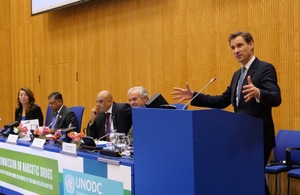Minister Philp attends the UN Commission on Narcotic Drugs
Minister for Crime, Policing and Fire promotes the UK’s balanced approach towards tackling drug use, with a focus on the challenge of synthetic opioids.

The UK is a long-standing member of the United Nations Commission on Narcotic Drugs (CND), which is the UN’s primary policymaking forum for international co-operation on drugs. It is mandated to supervise the application of the international drug control treaties and meets annually. This year’s CND took place across 14 to 22 March and marked the midway point in a 10-year strategy, established by the 2019 Ministerial Declaration, to tackle the world drug situation, during which a critical review of collective progress and new, emerging challenges was undertaken.
The Rt Hon Chris Philp MP, Minister for Crime, Policing and Fire, attended to represent the UK and lead a cross-government delegation from Home Office, the Foreign, Commonwealth and Development Office and the Department of Health and Social Care.
The minister delivered a national statement highlighting the government’s approach towards tackling drugs and made several pledges to work closely with global partners to tackle drugs supply, to deliver the UK Addiction Mission through collaborative working and innovation, and to ensure that treatment and recovery services are evidence-led and widely available. High-level attendees also included US Secretary of State Blinken, Colombian Foreign Minister Murillo, European Commissioner for Home Affairs Ylva Johansson, and Bolivia’s Vice President Choquehuanca.
Minister Philp used the CND as a platform to bring the increasing risk of synthetic opioids to the top of the international agenda, through bilateral discussions and by chairing a high-level panel discussion with US White House drug czar Dr Rahul Gupta, who noted that:
The US appreciates the UK’s leadership in drawing global attention to dangerous synthetic opioids and looks forward to deepening our partnership to help protect public health and safety.
The high-level side event also included speakers from the South African Narcotics Enforcement Bureau and the United Nations Office on Drugs and Crime’s Executive Director, Ghada Waly, to share perspectives and responses to synthetic opioids, helping to raise awareness of the threat posed by nitazenes. Minister Philp described a range of activity led by UK government:
We are doing work upstream, with countries around the world where drugs are cultivated, countries through which drugs transit, often using the National Crime Agency, which is the UK equivalent of the FBI. We have had some very notable successes in making large scale seizures of heroin and cocaine out of the UK when they have been in transit. We are also doing a lot of work at the border, with the UK Border Force, to try to intercept drugs as they enter the United Kingdom…
We have a lot of work going on combatting organised criminal gangs, domestically targeting them. We also enforce against drug consumption, particularly drug consumption in public. So, law enforcement is a critical and indispensable component in the fight against crime.
But law enforcement on its own is not enough. We’re also investing very heavily in a world class treatment and recovery system. We’re investing an additional £780 million, that’s almost £1 billion, over 3 years, to increase capacity in our treatment system. If we can get people treated successfully then the demand for drugs will reduce. And the associated criminality will reduce – both the criminality associated with drug supply, but also the addict committing crime to fund the offence.
The minister stressed the importance of tackling the emerging challenge of synthetic opioids, through zero-tolerance law enforcement, early warning systems, treatment, and international co-operation:
We established the taskforce, and it reaches across government, with various agencies involved – the Ministry of Justice, the National Crime Agency, the Home Office, the Department for Health, the domestic police, His Majesty’s Prison and Probation Service, and the Foreign, Commonwealth and Development Office, as this is ultimately an international problem with international supply chains that cross the globe.
We think that information and monitoring system is important so that, as this threat potentially develops, we can act very quickly to try to combat it… We are a very enthusiastic member of the US-led Global Coalition Against Synthetic Drugs. We will do everything we can to work with and support our American friends and allies, and countries around the world, to tackle this treat. And that is really what brought me here to Vienna today, as it’s only through international co-operation: by working together on supply, working together on law enforcement, sharing best practice, and by sharing what works in terms of treatment. By working together, we can beat the threat of synthetic opioids.
This emerging threat has also seen media attention, with minister Philp publishing an op-ed in The Times, to coincide with his visit and the government banning 15 synthetic opioids on 20 March.
The regular CND segment which followed the high-level event was led by officials from across Home Office, Foreign, Commonwealth and Development Office, Department of Health and Social Care and the Joint Combating Drugs Unit. The regular segment focused on the negotiation of 4 resolutions and voting on 23 substances to be place under international control. The UK played an active role in the 4 resolutions and continued to work closely with likeminded countries, to defend commitments on gender equality, human rights and civil society engagement.
CND ultimately provides an important platform, from which the UK promotes its balanced approach towards tackling drug use and related harms, maintains our international reputation, builds links with a range of international partners, and progresses the government’s ambitions on drugs and wider strategic policy aims.